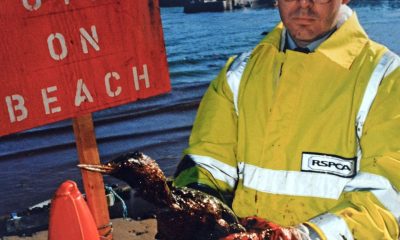News
Legal action threatened over ‘councillor’s’ status

THE COUNCIL’S Legal Department has failed to respond to two pre-action letters sent by solicitors acting on behalf of the local authority’s Labour Group as thedilemma over the future of David Boswell’s membership of the Council has taken yet another turn.
The Herald understands that the Council’s Legal Department now fears that if the Pembroke St Mary North ward was declared vacant, Mr Boswell might have a legal action against the local authority.
That potenital threat is two-fold: firstly, in relation to any change of position on the advice from Monitoring Officer Claire Jones he has relied upon; and, secondly, in respect of the potential prejudice formally removing him might cause to his scheduled trial at Swansea Crown Court.
Had Mr Boswell’s trial taken place as scheduled neither of the above issues could possibly have arisen.
Suspicion is growing among some council members that Council officers were counting on the trial being over to avoid embarrassment over the advice given to Mr Boswell by the officer upon whose advice they are entitled to rely upon as the last word.
However, the legal pressure has grown upon the authority. A letter before potential proceedings has been sent by a firm of solicitors acting for the Association of Labour Councillors.
With their initial letter unanswered, a second letter has now been sent from those solicitors which takes the Council to task both for their failure to respond to a letter marked ‘URGENT’, but also for statements made by the Monitoring Officer to the press and alleged comments made to councillors.
The Herald can confirm that despite receiving both letters, the Council has failed even to acknowledge their receipt at the time we went to press.
To quote the ALC Solicitor letter to the council: “We strongly disagree with your interpretation of this legislation and urge you to declare the vacancy as soon as possible. We do not consider that it is accurate or reasonable to describe a members’ seminar as a meeting of the local authority.”
The Council’s position turns on whether or not seminars for members are council meetings.
If they were Council meetings, the Council’s Legal Department would have been able to provide minutes of those meetings.
Council meetings, at law, are subject to rules in relation to publishing the agenda, setting out the the timetable, clear rules in regards to voting, and minute taking.
None of those apply to a seminar.
And the Council’s Legal Department refused to provide any of the information that define a Council meeting to this newspaper, claiming that it wanted to explain the legal situation to members first.
What that has to do with providing information that – if it exists – would prove the Monitoring Officer’s contention that seminars are meetings is unclear.
The Solicitors’ letter sent to the authority, sets out that position with a stinging rebuke to the Legal Department’s stated position, saying: ‘If it does not sound like a council meeting and it does not act like a council meeting, then it is more than likely not a council meeting’.
And ‘more likely than not’ is the key legal test. Not beyond a reasonable doubt, as in criminal proceedings.
Of course, the Council’s position would be stronger if it did not publish information likely to be of assistance to other potential parties to litigation.
At a meeting in 2011, a key Council committee considered a range of governance issues including member attendance at meetings.
The committee endorsed the position that members’ attendance should be published.
It even set out what meetings would be covered.
‘That the recording period cover each municipal year, and the record apply to attendances at formal Council body meetings (Council; Cabinet; Committees and Sub-Committees)’.
More fundamentally, it ‘suggested that training events/seminars be included in the attendance record’.
The distinction between what the Council then resolved were meetings on the one hand and members’ seminars and training on the other is crystal clear. If seminars were ‘meetings’ under the law, attendance would be recorded as a matter of course.
That is not the whole list of what is in the law covering council meetings. That also includes meetings which councillors attend as representatives of the authority.
However a list of what constitutes a council meeting cannot just be added to as and when a local authority finds convenient. A strong legal position would be that just because a statutory list of ‘meetings’ is not comprehensive (which is a fair reflection of the legal department’s position on the Local Government Act) that does not mean meetings which do not meet the criteria for council meetings can then be called council meetings.
The ridiculousness of the situation is best illustrated by the fact that on Wednesday (Feb 28), Mr Boswell attended a members’ seminar of an authority of which he is quite possibly no longer a member, while no press or public were admitted to the ‘council meeting’, no minutes were kept, and no agenda was published.
Why the Council’s legal department has been so reticent about replying to an urgent solicitors’ letter is a mystery, although no suggestion is made that it is either because council officers are hoping to ‘run down the clock’ in order to forestall taking any action at all or because they are paralysed by indecision.
In an email sent to all county councillors marked ‘CONFIDENTIAL’ in large red letters the Monitoriing Officer forcefully reminds members not to say anything that might jeopardise Mr Boswell’s trial. The Council’s monitoring officer appears also to suggest the Council has advice from ‘Leading Counsel’ (usually a QC) to support its position.
Advice from a barrister, even a leading one, is usually dependent on the content and quality of the instructions sent to one. There is a world of difference between a barrister being asked to advise a client and a barrister being asked to advise how a client might wriggle off a hook of their own making.
There is also a faint suggestion that legal advice obtained by the Council for the benefit of the authority might not be shared with all members. The way in which the email is set out makes it difficult to determine whether the Monitoring Officer would propose releasing advice on a limited basis. In addition, when quoting the Code of Conduct, Ms Jones states that members of a political party should consider whether or not they should declare ‘either a personal or prejudicial interest when speaking and voting’ on business of the authority.
That section of the email appears to be a remarkable attempt to prevent any debate by councillors of the cleft stick the council’s own officers have placed the authority in.
With dire warnings about ‘predetermination’ and ‘recent media stories’, Claire Jones seems to confuse discussing the potential that she might have got it wrong with expressing a view on whether or not Mr Boswell is guilty of the allegations – and that is all that they are – he faces.
The latter, it goes without saying is – quite properly strictly forbidden – the former is not the same thing at all.
Ms Jones’ email warns councillors of the dangers of expressing views as to whether or not she is wrong before an occasion upon which elected members can express a view. However, Ms Jones will know that pre-sentiment is not pre-determination, that councillors are permitted to make their minds up for themselves, and that the purpose of the rules about pre-determination and potential bias, as made clear by guidance given by the Public Services Ombudsman, is not to stifle either political or public discussion of contentious issues.
In addition, seeking advice on whether the Monitoring Officer is herself right or wrong is not predetermination by any means.
Community
Facebook ‘news’ site targeting Herald editor collapses after community backlash

Page disappears hours after offensive post sparks outrage across Pembrokeshire
A FACEBOOK page that presented itself as a local news outlet but repeatedly targeted The Pembrokeshire Herald and its editor has disappeared following a wave of public criticism from residents and charity workers.

The page, operating most recently under the name Clear Line News, published a lengthy post on Sunday (Feb 9) describing Pembrokeshire in highly offensive terms and mocking community groups, volunteers and local reporting.
Within hours, the post triggered widespread condemnation online.
By the end of the day, users reported the page had changed its name to “The Devil’s Feed” before becoming unavailable altogether.
Criticism arose after Marty Jones, PR manager for Sandy Bear Children’s Bereavement Charity, shared a screenshot of the post on his personal Facebook page and questioned its tone.
Dozens of residents replied, describing the language as “vile”, “nasty” and “beyond comprehension”.
Several said they had been blocked by the page after challenging it.
Others expressed particular anger at comments they said were directed towards a bereaved mother connected to a local fundraiser.
One commenter wrote: “How they can speak to a bereaved mother that way is beyond my comprehension.”
Name change and closure
As criticism mounted, users reported the page had been renamed before disappearing completely.
By Monday morning, it could no longer be accessed.
Earlier identity
The page’s history has also drawn scrutiny.
Before operating as Clear Line News, the account previously used the name “Dyfed-Powys Neighbourhood Watch”, presenting itself in a way that some residents believed suggested an official or community safety organisation.

A company using a similar name — GWARCHOD Y GYMDOGAETH DYFED-POWYS NEIGHBOURHOOD WATCH LIMITED — was incorporated on Nov 4, 2024, according to Companies House records.
The filing listed the director as Ajay Owen, recorded as “Lord Ajay Owen”, with a correspondence address in Llanfyrnach.
The company’s stated activities included public relations, communications and public order and safety functions.
Companies House records show the company was dissolved on Feb 18, 2025.
During the period when the page appeared to carry Neighbourhood Watch-style branding, it accumulated more than 1,000 followers, including engagement from public bodies such as Mid and West Wales Fire and Rescue Service.
After several rebrands, the page later emerged as Clear Line News in late 2025, adopting the look of a local news site.
Much of its content, however, focused on opinion pieces and attacks on local institutions and individuals.
Distancing statement
Following Sunday’s controversy, Mr Owen posted a statement saying he previously owned the page but no longer controlled it and had requested its removal.
Shortly afterwards, the account disappeared.
He told The Herald in December that he had sold the page for £10 within days of relaunching it under the new name. The purported new owner could not be contacted and no independent details confirming the transfer were provided.
Community response
While Pembrokeshire residents accept robust debate and scrutiny, many said they rejected what they saw as inflammatory or abusive social media content masquerading as journalism.
One resident wrote: “We should be grateful for where we live and try to make it better, not tear it down.”
Whether the page returns under another name remains unclear.
For now, it appears a site that set out to criticise the community ended up undone by that same community’s response.
Community
Nacro grant boosts neurodiverse support in Carmarthen

A £1,000 grant from Nacro is set to strengthen grassroots support for neurodivergent children, young people and adults across Carmarthenshire.
CANDO (Carmarthen Aberystwyth Neurodiverse Outreach Group) has secured the funding through the Connecting Carmarthenshire Preventative Service, enabling the volunteer-led organisation to expand its practical, person-centred work with local families.
Operating under the message “We see your future whatever the past”, CANDO supports people who often struggle to access the right help, feel heard, or find stability in everyday life. The new funding will increase capacity, provide resources for inclusive sessions, and improve access to early support for those who might otherwise slip through the net.

The group works closely with individuals and families to reduce barriers and build confidence — whether through education guidance, wellbeing support, advocacy, or help navigating local services. Leaders say the grant will allow them to respond more quickly to growing demand and keep sessions welcoming, accessible and consistent.
A CANDO spokesperson said: “This grant is amazing news for our community. Neurodivergent people can face extra pressures — from isolation and anxiety to difficulties being understood in education and services. This support will help us reach more people, provide practical help, and keep showing up for those who need someone on their side.”
Nacro’s wider mission mirrors that approach. The charity works across education, housing, justice, health and wellbeing, providing tailored support to help people build independence and move forward. Alongside frontline services, it also campaigns to remove systemic barriers and give disadvantaged people a stronger voice.
For CANDO, that bigger picture is felt locally. Families often face complicated pathways, long waits and fragmented services, and need clear guidance and community-based help that understands neurodiversity. By intervening early — before challenges escalate — the group believes it can improve mental health, education outcomes and overall wellbeing.
The £1,000 grant will fund additional outreach, materials and practical resources, helping more people feel safer, more confident and better equipped to move forward.
CANDO added: “We’re proud to work alongside Nacro’s vision of a society where everyone has the chance to succeed. This funding will do real good — right here in Carmarthen and beyond — and we’re grateful for the belief it shows in our community.”
Community
Students win King’s Trust award for transforming vandalised subway

A GROUP of students from Haverfordwest High School have been recognised on the national stage after winning a prestigious award at the Wales final of the The King’s Trust and TK Maxx Awards.
The students scooped the JD Foundation Community Impact Award during a ceremony held on Monday, January 19, at voco St Davids Cardiff, celebrating their efforts to transform a vandalised and neglected subway into a bright, welcoming mural for the community.
The project was delivered through the Achieve programme run locally by Pembrokeshire Youth Service, giving pupils a more hands-on, practical approach to learning outside the traditional classroom.
Reclaiming a neglected space
The group identified the graffiti-covered underpass, used daily on their walk to school, as somewhere that left a poor impression of the town.
Ffion, one of the students, said: “The subway was really unwelcoming and gave people a negative impression of the town. We wanted to reclaim the space and turn it into something positive.”
Working together, the pupils applied for funding, secured sponsorship from local businesses and organised school fundraising events. They also partnered with local artist Lloyd Griffiths to design and paint a colourful mural celebrating wellbeing, identity and pride in Haverfordwest.
The artwork even features their daily emotional “check-in” system – a tool they used throughout the programme to support each other’s mental health.
Building confidence and skills
Many of the young people involved had faced barriers in mainstream education, including social and emotional challenges or caring responsibilities at home. Several were at risk of leaving school with few qualifications.
Through the Achieve programme, they say they found a more supportive environment where they could develop confidence and practical skills.
Lateesha said: “We were really pushed outside of our comfort zone throughout the project, which helped us discover confidence in ourselves and just how much we’re capable of.”
The students developed teamwork, communication, fundraising and public speaking skills while delivering a lasting improvement to their neighbourhood.
Ffion added: “This project is our legacy. We’ve created something lasting that represents who we are and where we come from. It’s amazing what a cup of tea and a conversation can result in.”
Recognition on the national stage
Aaron Probert, JD Foundation Manager, presented the award on the night.
He said: “It is an honour to present this very special group of young people with the Community Impact Award. The way you have worked together to benefit your community is truly inspiring and the impact you have had is clear to see.”
The win now puts the Haverfordwest students in the running for a national King’s Trust Award, with finalists invited to a celebration event in May at London’s Royal Albert Hall.
The King’s Trust supports young people aged eleven to thirty with skills, training and opportunities, with three in four participants moving into work, education or training.
For these Pembrokeshire pupils, their award-winning mural is already proof of what can happen when young people are given the chance – and the support – to make a difference close to home.
-

 Health5 days ago
Health5 days agoHealth board targets rise in steroid and gym drug use across west Wales
-

 Crime6 days ago
Crime6 days agoSex offender jailed after living off grid in Pembrokeshire and refusing to register
-

 Crime5 days ago
Crime5 days agoTeacher injured and teenager arrested for attempted murder at Milford Haven School
-

 Business1 day ago
Business1 day agoComputer Solutions Wales under fire from customers
-

 Business4 days ago
Business4 days agoSix-figure negligence victory leaves retired builder trapped in divorce limbo
-

 Crime6 days ago
Crime6 days agoJohnston man remanded in custody over knife and assault charges
-

 News5 days ago
News5 days agoReform appoints Dan Thomas to lead party in Wales
-

 Crime6 days ago
Crime6 days agoProvisional licence holder admits drink-driving through town centre







































